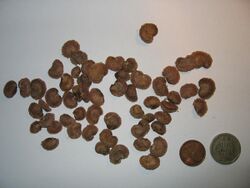Biology:Myrciaria
From HandWiki
Short description: Genus of large shrubs and small trees
| Myrciaria | |
|---|---|

| |
| Seeds of M. dubia | |
| Scientific classification | |
| Kingdom: | Plantae |
| Clade: | Tracheophytes |
| Clade: | Angiosperms |
| Clade: | Eudicots |
| Clade: | Rosids |
| Order: | Myrtales |
| Family: | Myrtaceae |
| Subfamily: | Myrtoideae |
| Tribe: | Myrteae |
| Genus: | Myrciaria O.Berg[1] |
| Type species | |
| Myrciaria tenella | |
| Synonyms[4][1] | |
| |
Myrciaria is a genus of large shrubs and small trees described as a genus in 1856.[5][3] It is native to Central and South America, Mexico, and the West Indies, with many of the species endemic to Brazil .[4] Common names include hivapuru, sabará, and ybapuru.
The jaboticabas are a significant commercial fruit in Brazil . The fruit is grapelike in size and appearance, and often likened to a muscadine grape in taste. Myrciaria dubia, the camu-camu berry, is grown primarily in flood-zone areas of Peru and has one of the highest vitamin C (ascorbic acid) concentrations of any fruit, alongside Terminalia ferdinandiana.
Formerly placed here
- Plinia cauliflora (Gardner) O.Berg (as M. cauliflora (Mart.) O.Berg and *M. jaboticaba (Vell.) O.Berg)
References
- ↑ 1.0 1.1 "Genus: Myrciaria O. Berg". Germplasm Resources Information Network. United States Department of Agriculture. 2009-01-27. http://www.ars-grin.gov/cgi-bin/npgs/html/genus.pl?7907.
- ↑ lectotype designated by McVaugh, Taxon 5: 143 (30 Jul 1956)
- ↑ 3.0 3.1 Tropicos, Myrciaria O.Berg
- ↑ 4.0 4.1 4.2 Kew World Checklist of Selected Plant Families
- ↑ Berg, Otto Karl. 1856. Linnaea 27(2–3): 136, 320-338 in Latin
- ↑ "GRIN Species Records of Myrciaria". Germplasm Resources Information Network. United States Department of Agriculture. http://www.ars-grin.gov/cgi-bin/npgs/html/splist.pl?7907.
- ↑ "Myrciaria O.Berg". Plants of the World Online. Kew Science. https://powo.science.kew.org/taxon/urn:lsid:ipni.org:names:326101-2.
Wikidata ☰ Q2470494 entry
 |

